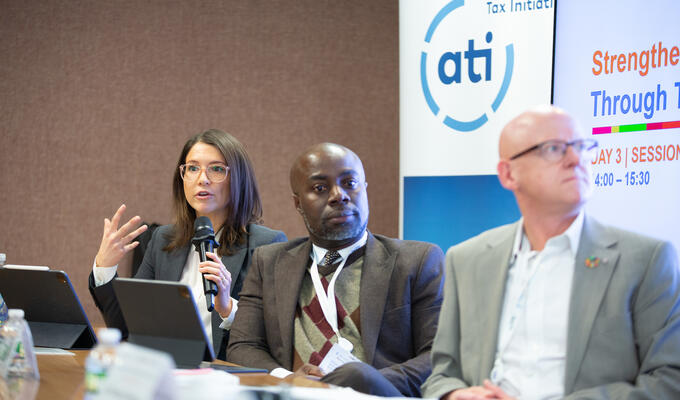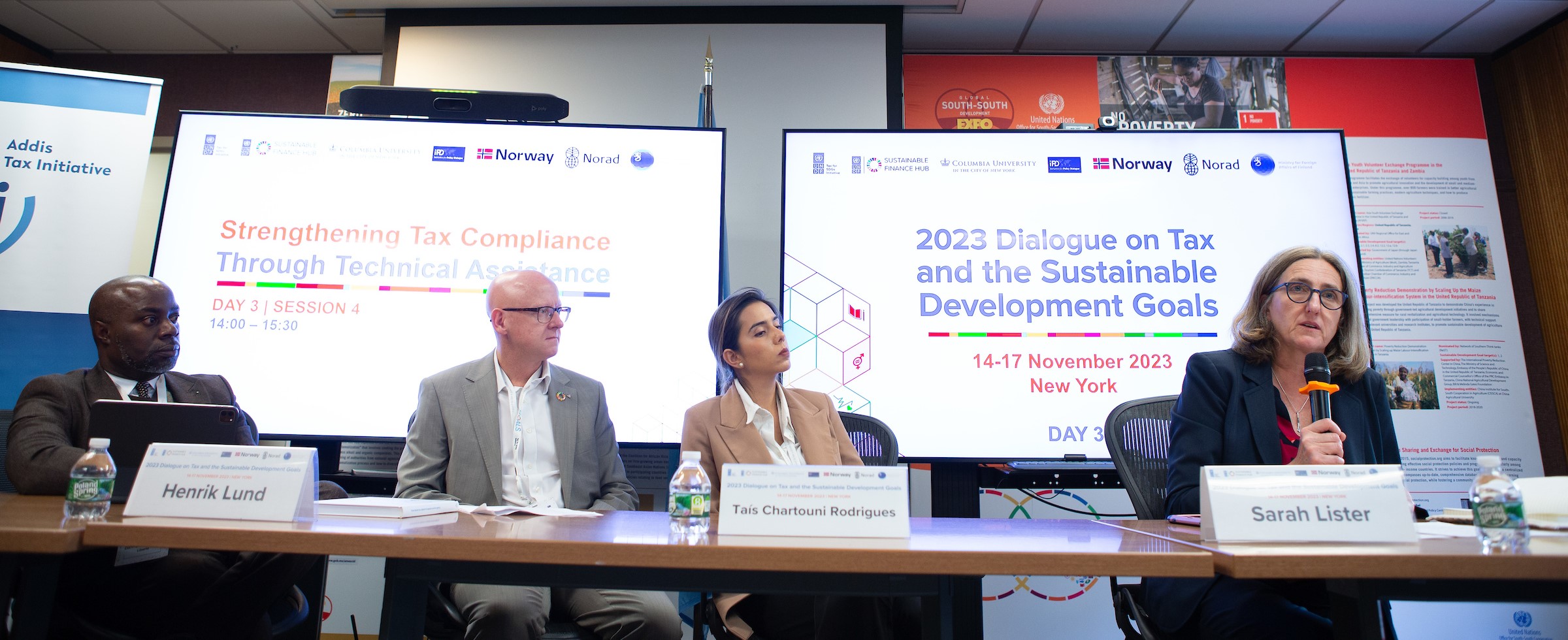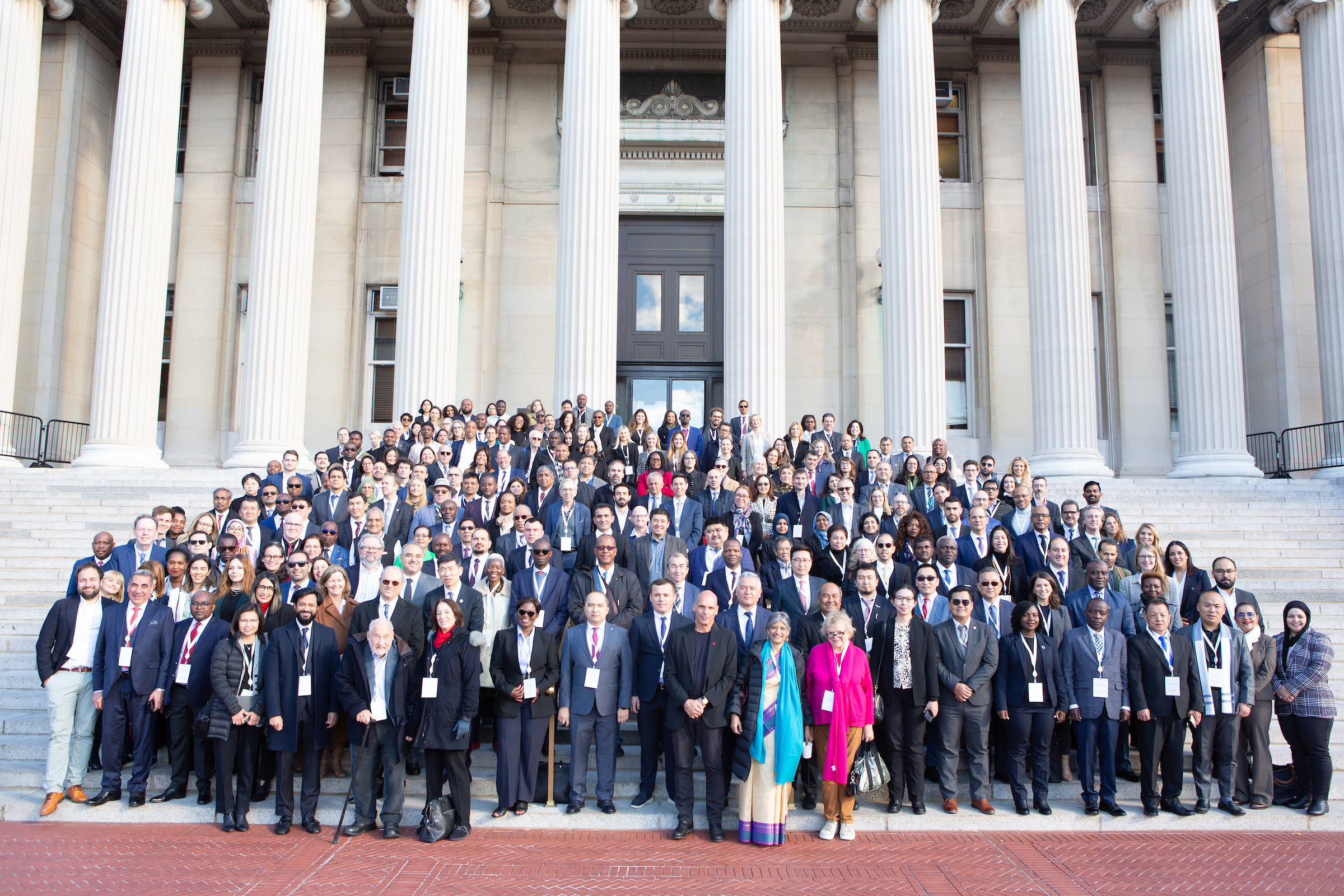ATI discusses tax compliance in the context of the 2023 Dialogue on Tax and SDGs

On 16 November, the Addis Tax Initiative (ATI) co-hosted a session as part of the Dialogue on Tax and SDGs 2023” in New York. Organised in collaboration with the United Nations Development Programme (UNDP) and the Swedish Tax Agency (STA), the session “Strengthening Tax Compliance Through Technical Assistance” discussed the potential of collaborative approaches of bilateral and multilateral support programmes to promote taxpayer trust and participation in tax systems in developing countries.
“Trust is an important driver of voluntary tax compliance.”
Building trust and participation in tax systems among citizens is crucial for enhancing domestic revenue mobilisation (DRM). Similarly, DRM and development finance are at the heart of the Agenda 2030 and the Sustainable Development Goals (SDGs).
The session
Kickstarting the panel, Vanessa van den Boogard, researcher at the International Centre for Taxation & Development (ICTD), highlighted four key drivers of trust and voluntary tax compliance: service provision, transparency, taxpayer engagement, and procedural fairness. Building on these elements is crucial for establishing a foundation of trust towards the tax system. Sarah Lister, Head of Governance at UNDP, further underscored the importance of trust in governance systems for development and peace outcomes. Trust, the social contract, and governance are interconnected, particularly within the framework of corruption, and have reciprocal effects on one another, as emphasised by Lister.

Sweden is known for its high voluntary tax compliance despite relatively high tax rates, and Swedish people hold “high” or “very high” trust towards the Swedish Tax Agency (STA) / Skatteverket. Henrik Lund, Head of Office for International Projects at STA, explained to attendees the path his agency took to achieve such an improvement in its reputation. A survey of Swedish taxpayers regarding their perception of the STA revealed that helpful and listening tax officers increased trust, while correct but indifferent tax officers actually decreased trust, highlighting the importance of having a human approach to taxpayers. The book “From feared tax collector to popular service agency” reflects how the Swedish Tax Agency changed its attitude towards taxpayers, as well as the taxpayers’ attitudes towards it.
Lund’s intervention also addressed STA’s capacity-building initiatives, which encompass support to other tax agencies through peer-to-peer programmes or projects. These initiatives are typically structured within long-term bilateral cooperation models lasting 3, 6, or 9 years. They are demand-driven and can cover any area of a tax administration’s work, ranging from human resources to risk management. However, by implementing more comprehensive programmes, rather than tax agencies working with tax agencies, and by including other agencies such as statistics, social security, environment, etc. “we could come further”, concluded Henrik Lund, highlighting the intersectionality of taxation and the need for a holistic approach in the development efforts in the field.

Tais Chartouni Rodrigues, in representation of the Secretariat of the Addis Tax Initiative, explained ATI’s efforts in promoting tax compliance and citizens' trust in their tax systems. The theme of the session directly resonates with Commitment 4 of the ATI Declaration 2025, which reads:
ATI members commit to enhance space and capacity for accountability stakeholders in partner countries to engage in tax and revenue matters.
In Commitment 4 of the ATI’s roadmap, “taxation is understood not only as a technical concept but also a political issue that is very relevant to increase cohesion in society and enhance the social contract”, explained Taís Chartouni. Before introducing the ATI Matchmaking Platform, the ATI Secretariat representative elaborated on Commitment 4 and its monitoring indicators, which were developed jointly by ATI Members. The ATI Stocktaking of Initiatives and Tools for Enhancing Accountability, a compilation of products and activities related to accountability in tax and revenue matters; the ATI webinar on “Tax accountability through citizen participation and education”; and the ongoing development of an ATI Pocket Guide on Tax Expenditures for Parliamentarians are some of the ATI efforts and initiatives undertaken to fulfil the objectives of ATI Commitment 4.
The ATI Matchmaking Platform is an online platform that supports DRM collaboration between ATI members. It enables countries and organisations to connect based on their need for support or the availability of relevant expertise. Support is not predefined and versatile, ranging from study visits to specific technical assistance. The Platform serves as a hub for information and technical knowledge exchange, donor coordination, and networking opportunities in the field of DRM. Sweden and Sierra Leone initiated DRM cooperation through the ATI Matchmaking Platform.
Darlingston Talery, Commissioner for Domestic Taxes at the Liberia Revenue Authority (LRA), presented Liberia’s efforts to improve tax compliance and foster DRM, especially in the context of the technical assistance provided by the Addis Tax Initiative and the STA. Delegates from LRA attended the first ATI regional workshop on Tax Expenditures (TEs), focusing on West Africa and its Follow-Up Technical Meeting. This Delegation went back to Liberia and started to engage other internal stakeholders relevant to granting tax expenditures. Previously, LRA had realised that some of the TEs granted by the government were, in fact, eroding the tax base and the government’s revenues to fund public services. After attending the first workshop in Lagos (Nigeria), these delegates from Liberia set up a National Taskforce for the Monitoring and Evaluation of Tax Expenditures to ensure that existing tax incentives were evaluated before considering the approval of any subsequent incentives. This National Taskforce is a national body comprised by officials from the LRA, the Ministry of Finance, the National Investment Commission – the body responsible for granting TEs, and the Environmental Protection Agency.

The Liberian delegates took tangible actions following the ATI workshops on tax expenditures, leading to increased accountability within the tax expenditures policy cycle. The inclusion of more stakeholders in the process enables them to pose crucial questions, such as whether the granted incentives align with their intended objectives, contribute to employment growth, or mitigate CO2 emissions, influencing the decision-making process. A significant outcome is that the Ministry of Finance in Liberia has put a hold on issuing new tax incentives until the technical reports issued by the National Taskforce and its recommendations are considered. The Ministry has also reduced the number of years for which tax expenditures can be granted from 5 to 3 years. This shift indicates a more transparent, fair, and examined approach to TEs in Liberia.
Talery concluded his intervention by mentioning some elements of the LRA-STA cooperation, including the modernisation of the Liberian tax administration towards more efficient taxpayers’ services. Aid was requested by Liberia, who had previously identified their needs through the ATI Platform. “We managed to achieve those things because it was not supply-driven technical assistance, it was demand-driven”, closed the Commissioner.
The panel was moderated by Fredrik Werring, advisor at the Norwegian Agency for Development Cooperation (NORAD).
Cooperation to advance the SDGs
In achieving their vision of promoting effective DRM towards the SDGs, Sweden, Liberia, and other members of the ATI have engaged in technical cooperation and, together, share the view of the importance of strengthening tax morale and increasing transparency in tax administration. Aligned with ATI’s vision of tax systems that work for people and advance the SDGs, this year’s Dialogue on Tax and SDGs focused on how tax administration can build equitable societies with fair tax systems. Taxation allows developing countries to increase economic resilience and raise continuous revenues to finance health, education, and climate action. In other words, fair taxation allows developing countries to independently finance their own development.
The Addis Tax Initiative gathers partner countries, development partners, and supporting organisations to promote fair and effective DRM, policy coherence, and the social contract through partnerships and knowledge building.
The whole session recording is available here.
